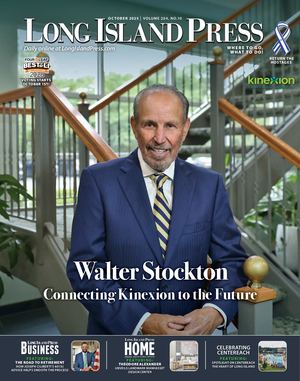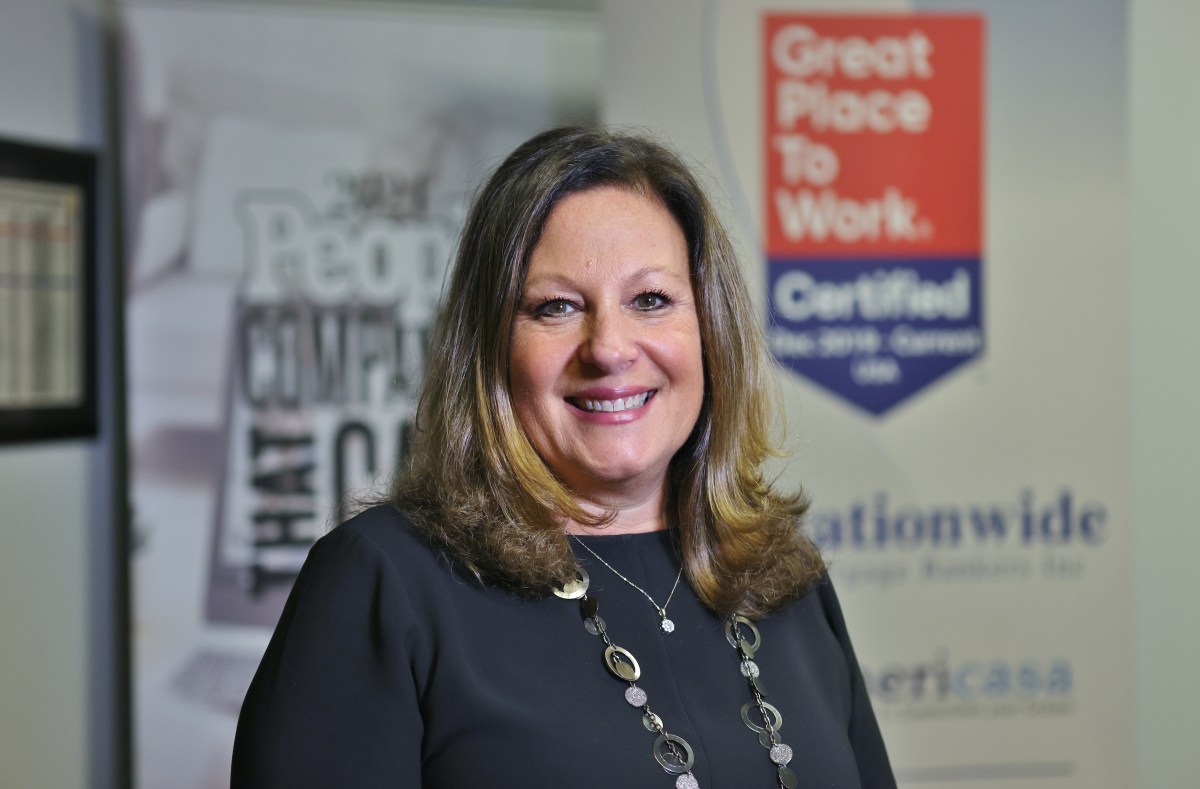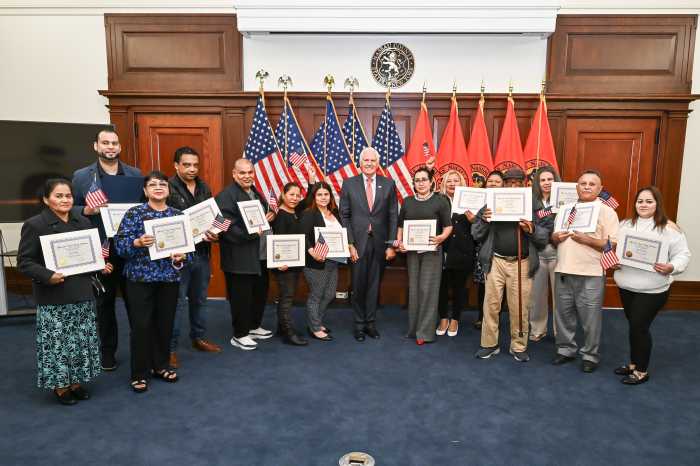For over 30 years, Christine Perlow has been navigating mortgages for the people of Long Island. She is currently with Nationwide Mortgage Bankers out of Melville, NY. Her knowledge of the ins and outs of these turbulent waters and complicated loans has helped her clients achieve home ownership, many of whom are veterans or first-time home purchasers. Perhaps this is why she has been repeatedly named a Hall of Famer by the New York Mortgage Association and recognized as one of the Top 100 Mortgage Loan Officers in the Country. She graciously agreed to share her insights with Great South Bay News, and they are worth the read.
GSBN: What makes you interested in helping first-time home buyers and veterans?
CP: It is the American Dream to own a home! It puts a smile on my face to know that I was able to help with that journey. Getting into your first home is not easy, and all the different programs can be challenging to navigate. I pride myself in being able to customize every loan. Every buyer is different and has different expectations and needs. Everyone’s life, circumstances, income, assets, and credit can vary. Every transaction is unique and different. I also pride myself on finding the right program for the right individual, couple, and family. It is my job to be a good listener and be able to come up with a plan that works for everyone.
GSBN: Give me some examples.
CP: A few programs require as little as 3% for the down payment. The NYS SONYMA program is one that requires as little as 3% for a down payment. This program only requires the borrower(s) to have 1% of their own funds in the transaction. The NYS SONYMA program offers down payment assistance that can be used to help with the down payment and/or the closing costs. You can also combine additional assistance, or grant funds, gift funds and/or a seller concession!
Getting into your first home does not take as much money as you think.
When our parents purchased their house, they considered it their home. The new generation knows its their home, but also an investment and a way to build equity for their future. The hardest part is taking the plunge to purchase your first house. It is very gratifying for me to be able to be on this journey with them.
GSBN: Do you find that there are lending nuances between the Long Island regions?
CP: Not really. I have options available for all markets! From North Shore to South Shore, from East to West. There is a program for anything you may be looking to buy: single-family, multi-family, condo, and coops! I have something for everyone. I have a soft spot for my first-time buyers and Veterans!
GSBN: What are the advantages of somebody entering your office and working with you rather than just walking into a bank?
CP: So, fortunately and unfortunately, the “big banks” no longer have mortgage professionals to help assist with the mortgage process. The “big banks” no longer find the mortgage professionals valuable. They are looking for cookie-cutter loans. It can be very frustrating if you go and are looking for someone to walk you through the process and explain the different mortgage options available. The online lenders are also tough. Many people do not understand how the mortgage world looks at information. One of the big mistakes is how to figure out income. Many people, when asked, give their net income after the taxes have been taken out. The mortgage process is the gross amount for W2 income. When you have someone self-employed, it is the reverse. You use the net income, not the gross, after deducting the expenses! This is just one example of the misunderstanding that can cause someone who thought they were not able to or maybe not able to purchase a new home! It’s important to have a seasoned mortgage professional review your income, assets, and credit.
There are many different ways to put the puzzle together. No two mortgage applications are the same. There is a large menu of mortgage products available to help customize the right product and program for all different types of scenarios. There are times when someone may not be able to purchase right now; however, that means they need a plan to purchase in the future! Maybe they need to repair credit, pay down some credit accounts, save a little more, or maybe there is a new job or promotion in their future. Whatever the situation, it is about being educated and prepared for one of the largest purchases you will ever make.
GSBN: You’ve been in the business for 30 years and weathered many storms. You’ve been through things like the mortgage crisis of 2008. How did you survive it? How did you get your clients to survive it?
CP: I reinvented myself. There are always two types of people in the market. No matter the market, you will always have first-time buyers. It does not matter what market first-time buyers have to buy, whether it’s a declining market or an appreciating market; they must invest in their first house.
The second is the retiree or estate market. Someone’s always leaving or moving to the next spot. These two categories are always situations where someone has to buy, and someone has to sell. Right now, we have a housing shortage. We have the shortage because so many people took advantage when the rates were at a historic low. Some purchased their first homes, some upgraded, and some refinanced and made improvements to their homes. The question is, why are they going to leave? So many are staying put for now; however, my first-time buyers and retirees are always making moves regardless of the market. They have to.
GSBN: Tell me one of your success stories.
CP: I recently had a young woman looking to purchase a home on Oak Beach that needed to be fully renovated. She had spoken to three different lenders and two different contractors before she found me and was in tears when we first spoke. She had told me her story and what was happening with the other lenders she was working with, only to be told, “Sorry, we can’t help you,” after two and a half months. As she was crying on the phone, she said, “Please tell me you can help me.” After listening to her story and what she needed, I answered, “Yes, I can absolutely help you.”
It was one of those situations where if it could go wrong, it did. We had many hurdles to overcome, but we did it as a team, and she is now a very happy homeowner. She got a great deal and did a lot of hard work to get it done, but she and her family could not be happier. We never gave up and closed on her home.
So when you ask, “Why a mortgage professional?” There are more and more of these stories that I could give of situations that needed to be navigated and adjusted during the process. Unfortunately, with this kind of story, the “big bank” just issues a denial letter. We turned her lost hope into the American Dream.
Many people ask if I am good at math. My answer is I love math, but what I really love is solving puzzles. Anyone can put 2 + 2 = 4; there is nothing special about that. However, it is about listening and knowing how to solve the puzzle in my business. You must pay attention to the details, know the different products and programs available, and find the right fit. That is why you need someone who knows the ins and outs of the mortgage industry.
GSBN: Okay, now I’m speaking to you more as a Long Island resident than a banker. You and I both live on South Shore Long Island. What do you think makes living where we live so special?
CP: Oh my goodness, we all know what makes it unique…we love it! I’m a South Shore girl, born and raised. I was at a Billy Joel concert years ago, and he said it best. The North Shore is nice, but if you want to live on Long Island, the only place is the South Shore! There is nothing like it.
GSBN: Are there any resources available to first-time home buyers or veterans that you believe may be overlooked or under-utilized?
CP: If you are willing to put in the time and your documents are organized, there are some programs and options to explore. You can find different grants that can be layered with some of the first-time home buyer programs available.
The Veteran programs are amazing and well-deserved! We have a few different options available. The beauty of the VA program is that it allows for 100% financing with no monthly mortgage insurance, no minimum down payment requirements, and a relatively more straightforward debt-to-income ratio qualification. It is a little more lenient than the traditional programs available.
GSBN: Are there subtle differences between Long Island town grant programs, such as Brookhaven and Islip?
CP: Yes, there are. There are also resources available that can help you sort through some of the different grant and assistance programs available.
GSBN: When I was a first-time home buyer, my late husband and I purchased the house in 2006; we went to brokers and all kinds of people. Eventually, we did manage to purchase our house, but nobody told us there was a program in Islip for first-time home buyers, and we could have used that knowledge. What do you have to say about that kind of experience?
CP: You know what, it’s hard… We go back to when you asked me your first question, ‘What makes you different?’ There are many people in the industry, and what’s big now is the online companies where you just Google something, and you will find mortgage companies, but their base is in Ohio. They don’t know what’s available here in the local area. It’s really important to find someone who knows the different opportunities in the local market because there are so many of them that the general person doesn’t know.
GSBN: What are the challenges and advantages in today’s Long Island real estate market?
CP: One of the big challenges today is the Certificates of Occupancy (CO). We have great townships; however, sometimes, their ability to expedite information is hard with the timeframes and deadlines that come with purchasing a home. When you want to buy a house, any delay can cause all sorts of challenges and issues.
GSBN: What is the best way to navigate such challenges?
CP: Research the choices you make for people to assist you with purchasing your property. Make sure you have real estate professionals to work with you. Speak to family and friends about their good experiences and make a few phone calls to the people they may refer. An example would be the attorney you choose to represent you in the transaction. Not all attorneys are real estate attorneys. Some are general practice; you need someone who knows how to help you navigate if an issue arises. You don’t want your uncle or a friend of a friend who “does some real estate” to be the ones you have on your side. When issues happen (unfortunately, things happen), you want your real estate team to know what to do and have the right connections to get the help and answers you need as fast as they can.
GSBN: What is good about the market right now?
CP: Any market is the right market because you never know what is coming around the bend. Many of my first-time buyers, especially during COVID-19, were told by friends and family to wait. Wait for house prices to come down, they have to come down––but that’s not what happened. House prices increased. It was unfathomable, but they did. Some advice I heard was that if interest rates go up, house prices must come down. Again, that did not happen in this market. We have a surplus of qualified buyers in the market. We need inventory, and people are looking to make some moves, but there is no urgency in the market to move. The shortage of inventory is causing the frenzy right now. My advice is that if you are comfortable with the purchase price and ready to buy, don’t wait for the market to change; buy now. You may miss an opportunity if you wait for rates to come down. If rates do come down, you can always refinance. Don’t wait for the prices to come down either; there is a chance that may not happen.
There is a phrase in my business that says you marry the house, but you date the rate. You can always change the rate, but you can’t change the house.
GSBN: Christine, I’m coming to the end of my questions, but is there anything you want to discuss that my questions did not raise?
CP: There are a lot of opportunities in real estate. There are all different types of real estate investments to purchase and all other types of mortgage programs to assist. Many programs are outside of the box––programs can help with every kind of situation. We have programs available for self-employed people who are challenged with the income to qualify––we have a program for them. People looking to invest in real estate––we have a program for them. We have programs that require limited documents, like a 12-month bank statement or a profit and loss statement. They are considered asset-based programs. There is something for all different types of situations. A true mortgage professional knows how to help put the puzzle together and help achieve your real estate goals. Sometimes, you may be surprised by what is available if you think you can’t get a mortgage.
I like to say phone calls are free! Make the call and learn about the different options available.
Christine Perlow can be reached at 516-509-0429 or email through her online portal at nmbnow.com/christine-perlow



































